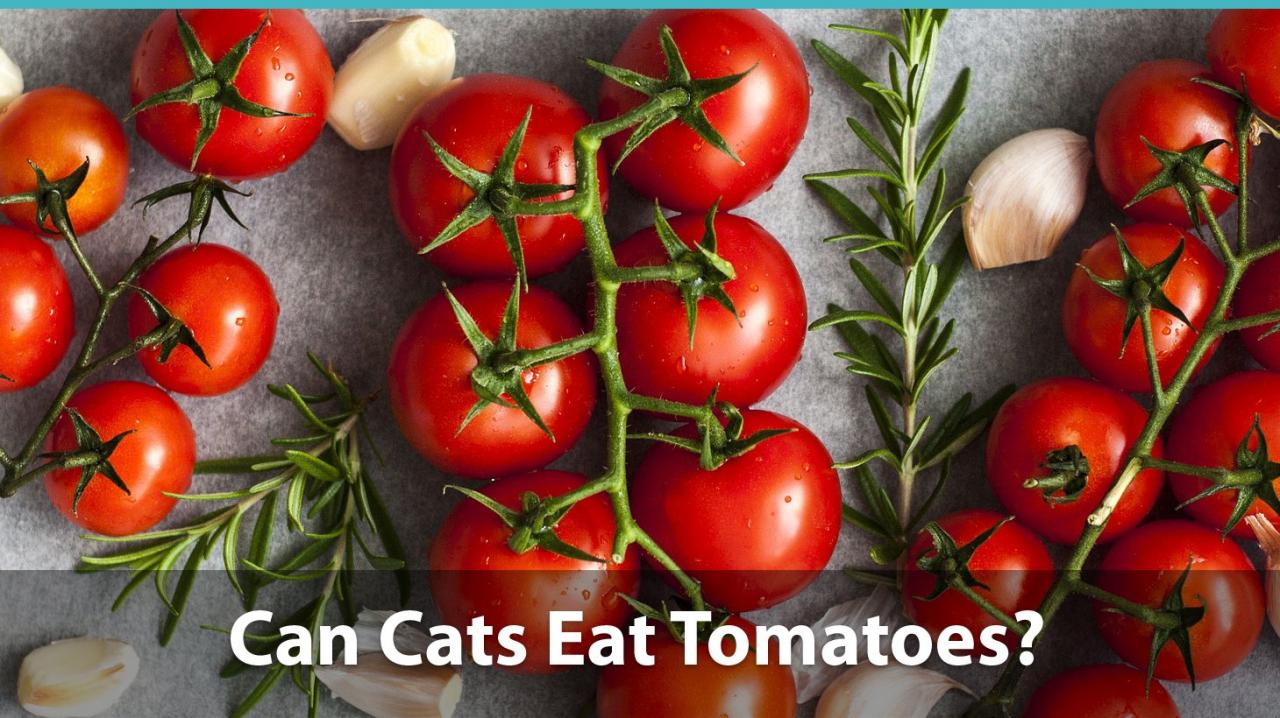Cats have a reputation for being fussy and choosy about what they eat but some of them are ready to try anything that is in front of them. It sounds fun to share the food you like with your cat but sometimes the ingredients of your food are rather toxic for your cat, so it is better to understand the health and needs of your cat beforehand.
You may be wondering why some cat foods have tomatoes included and some have not, you may have heard that tomatoes are bad for the cats or even poisonous. The question arises, are tomatoes safe for the cats? Why only a few cat foods have tomatoes included and others have not?
So these questions have both a yes and a no answer, it depends entirely on a few factors but mainly on your cats’ tolerance levels towards the acidity.
Can Cats Eat Tomatoes?

It is not recommended. Your cat should avoid eating a tomato, it has an acid called solanine present inside it which is toxic for the cats and can cause serious illness in cats. However, it is the unripe tomato and the plant stem and leaves which is of the most harm to the cats; cats must never be given the green part of a tomato. Some toxins found in the tomato plant can cause gastrointestinal complications and other problems. That being said, the ripe fruit is to some extent safe for your pet but it should only be treated as a treat and not a necessity.
The ripe red tomato is safe for cats only in the following conditions:
- Modest and moderate amounts.
- Unseasoned and fresh.
- If your pet has no current health problems.
The biggest problem for the cats from eating a tomato is choking on the seeds or bigger pieces. The cats are small animals and they have small mouths and throats which proposes the biggest possible threat of choking. Furthermore, the seeds can end up lodging in the digestive system and can oppose seriously dangerous and life-threatening blockage in the tract. When cats are given the tomatoes to eat, they must be thoroughly washed, deseeded, and in bite-size pieces, so that the choking hazard is eliminated. Tomatoes have great nutritious value and have a lot of health benefits but they should never be a large part of a cat’s regular diet.
Can Cats Eat Tomato Sauce?
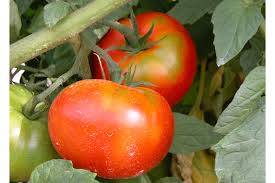
A simple answer would be a no; it is not recommended however it is not that harmful as well. If the tomato sauce has garlic and onion in it then you must not let your cat have it, since onion and garlic are toxic to the health of a cat. Ketchup and other tomato sauces are highly processed and preserved with tons of chemicals, they have several seasonings in them and that could trigger allergies or reactions in cats.
Are Cooked Tomatoes Safer or Better?
The toxic components present in tomatoes are not killed by cooking, however, the enzymes that make these toxins are surely killed. Some cats do better with cooked tomatoes and some do well with raw ripe tomatoes so it entirely depends on the preferences. All you have to be diligent about is de-seeding the tomato and cutting it into bite-size pieces to avoid the choking threat. The same principle applies to both cooked and raw tomatoes, now be cooked or raw they do not differ in nutritious value.
Tomato Toxicity Facts
Following are a few facts about the toxicity of tomatoes:
- Tomatoes are related to the nightshade plant family and they produce toxic alkaloids and nicotine as well.
- The presence of solanine is in the tomatoes.
- The concentration of solanine and tomatine reduces as the fruit ripens.
- The toxin named tomatine is not as toxic as solanine, however, both are toxic.
- This concludes that as the fruit ripens, the concentration of toxins decreases which eventually makes it ok for the cats to eat the ripen tomato.
About Tomato Plant Poisoning
If your cat eats the leaves or stems of a tomato plant, you need to get it to your vet right away. The tomato plant is not safe for cats at all; it can cause serious illness in cats as they are toxic to them. The tomato plant poisoning is not fatal but it can cause serious uncomfortable symptoms in cats. But it is still not a great thing to give to your cat, since it has salt present in it in large quantities hence it causes digestive problems for the cats i.e. seizures, excessive urine or thirst, sodium poisoning, etc.
Causes of Tomato Plant Poisoning
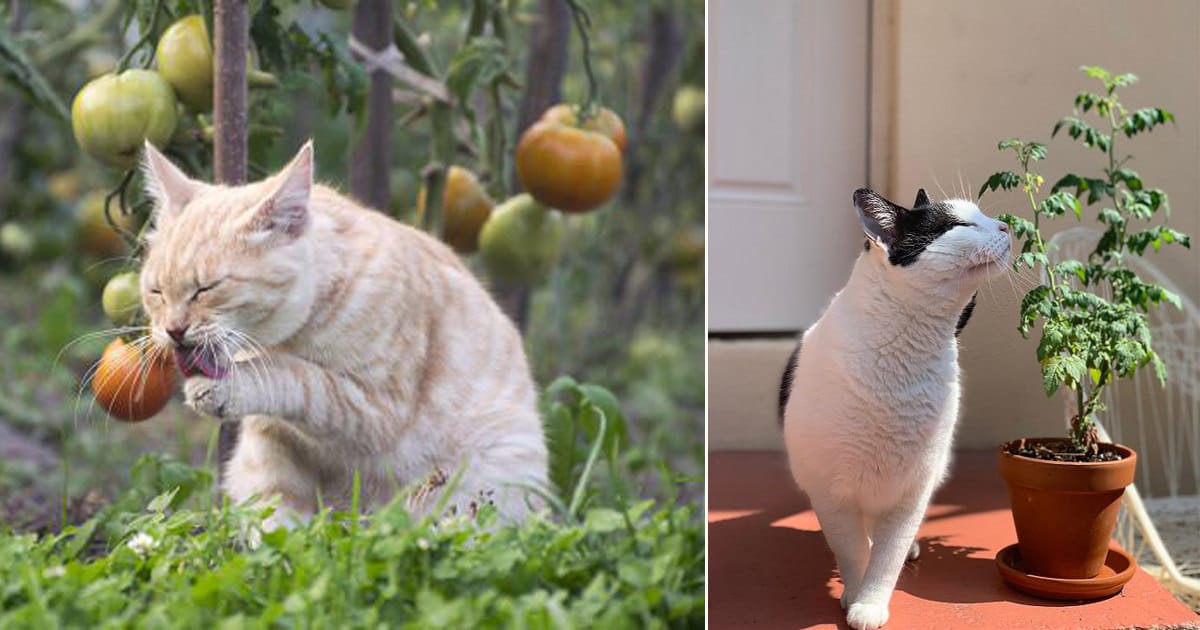
Solanine and alpha-tomatine are the main reasons behind the tomato plant poisoning in cats, these acids are very toxic for the stomach of your pet. The green part or the unripe tomato has these acids present in them and their ingestion causes poisoning in the cats. Cats are curious animals and their habit of biting off a plant here and there out of boredom can cause them serious harm. Your cat should never have easy access to your garden if you have planted tomatoes or other fruits or vegetables that are toxic for the cats.
Symptoms of Tomato Plant Poisoning
If your cat has eaten a tomato or a tomato plant stem then certain symptoms can be seen in your pet i.e.
- Lack of appetite
- Weakness
- Slow heart rate
- Upset stomach
- Vomiting
- Diarrhea
- Lethargy
- Behavioral changes
- Excessive drooling
What Fruits Should Never be Given to the Cats?
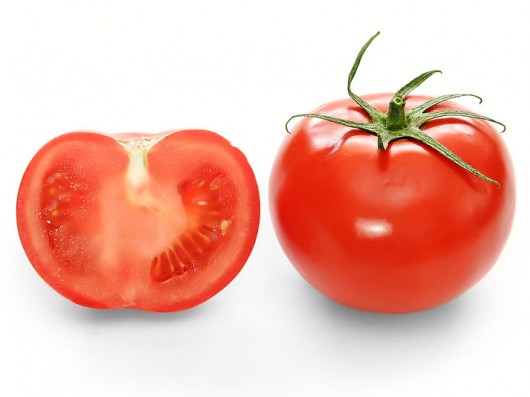
Fruits in small quantities are often fine for the cats as long as they are not used as meal replacements; the sugar content in fruits is the main problem. The fruit isn’t a problem for cats but most of them won’t even have fruit in any quantity but there are certain fruits that cats must always stay away from:
- All citrus fruits are high in citric acid and cause an upset stomach in cats.
- Coconut, again it can upset the stomach of a cat.
- Currants, grapes, and raisins should never be given to the cats; they are toxic to their health.
Can Cats Eat Vegetables?
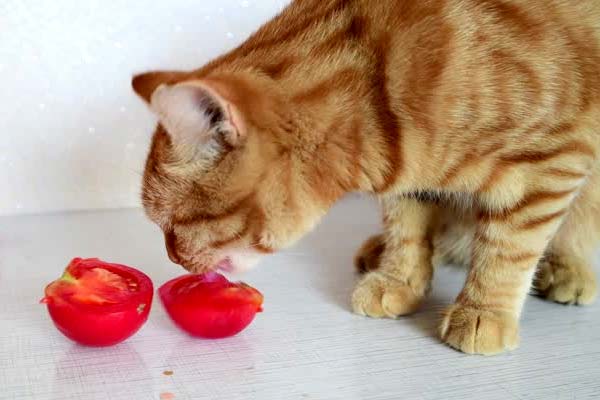
Veggies are low in sugar content which makes them almost safe for cats. There are good nutrients present in the vegetable so they can be a part of a balanced diet of a cat, following are the veggies that are not toxic for the cats:
- Broccoli
- Green bell peppers
- Celery
- Spinach
- Pumpkin
- Peas
Why Do Cat Foods often Contain Tomatoes?
If you read the list of ingredients present on the back of the packet of cat food then there are high chances that you’ll see tomatoes in that list. The tomatoes used in cat foods are ripe and red ones and that too in a very small quantity, hence; it does not have any damaging or harmful effect on the cats.
Most of the experts agree on the fact that cats can eat ripe tomatoes and that the unripe tomato is the main problem but do not worry there are lesser chances of your cat nibbling on green tomatoes because they do not like the taste and texture of green tomatoes anyway. The texture of unripe tomato is not pleasing to a cat at all which makes it very less likely for your pet to consume it.
Conclusion
Always remember that a cat’s body is small as compared to a human’s body, so even a little poison can go a long way. However, for these toxins to be fatal for the cat, they have to be ingested in a large quantity; a small quantity of these acids can only cause illness and upset stomach in cats. And in most cases, these toxins are excreted in the form of feces and urine from the cat’s body. The bottom line is that if your cat eats a ripe tomato, it should be fine for it but if it consumes a tomato plant or unripe fruit then there is a dire need to consult your local vet. And of course, if your cat is allergic to tomatoes then they must stay away from them at all costs. Anything that differs from your pets’ regular diet can give it an upset stomach, especially when given in bulk.
Cats are small animals and they have fragile stomachs, so it is important to feed them accordingly. All the treats and foods must be introduced slowly and sparingly to the cats. A cat is a carnivore and must be given a diet that is nutritionally appropriate for its digestive tract. The regular meals of a cat must be balanced with all the nutritions, they can eat everything but in an appropriate way and amount. Further, cats can eat human food if its nutritional value is appropriate for them. Cats are specific about their food choice but they do enjoy a different tastes and changes in their diet. We hope this article answers most of your questions regarding the diet of your small pet.
